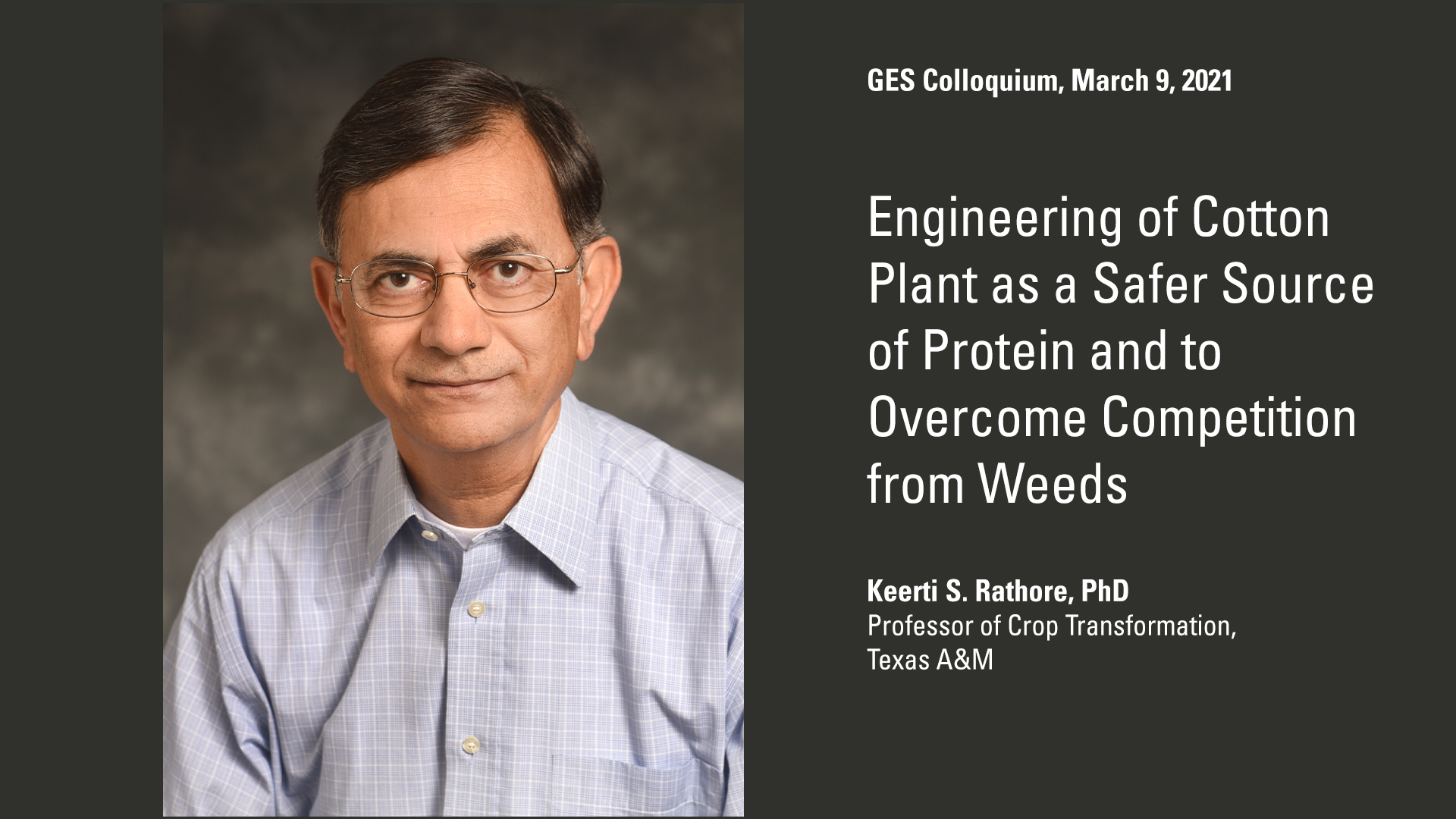
- This event has passed.
Keerti Rathore – Engineering of Cotton Plant as a Safer Source of Protein and to Overcome Competition from Weeds | GES Colloquium (Zoom)

GES Colloquium Home | Zoom Registration | GES MediaSite | Video Archives | Podcast | @GESCenterNCSU | Newsletter
Engineering of Cotton Plant as a Safer Source of Protein and to Overcome Competition from Weeds
Speaker: Keerti S. Rathore, PhD, Professor of Crop Transformation at Texas A&M
Abstract
Cotton, the most important natural fiber crop, also produces enough seeds containing ~10 million tons of protein. A broader use of this resource for food and feed is hampered by the presence of toxic gossypol in the seed. Twenty-five years of work in my laboratory has culminated in selectively eliminating this toxin from the seed and obtaining deregulation from USDA-APHIS and FDA approval for its food/feed use. More recently, we have demonstrated the potential utility of the ptxD gene (encoding phosphite dehydrogenase) in transgenic cotton in combination with phosphite as a system to manage weeds that are becoming increasingly resistant to herbicides.
Related:
- (2020) Ultra-Low Gossypol Cottonseed: Selective Gene Silencing Opens Up a Vast Resource of Plant-Based Protein to Improve Human Nutrition, Critical Reviews in Plant Sciences, 39:1, 1-29, DOI: 10.1080/07352689.2020.1724433
- Devendra Pandeya, Damar L. López-Arredondo, Madhusudhana R. Janga, Keerti S. Rathore, et. al. (2018) Selective fertilization with phosphite allows unhindered growth of cotton plants expressing the ptxD gene while suppressing weeds. PNAS Jul 2018, 115 (29) E6946-E6955; DOI: 10.1073/pnas.1804862115
Speaker Bio
Dr. Keerti Rathore joined Texas A&M University in 1995. His early education was in India, followed by a Ph. D. from Imperial College, London in electrophysiology. While working at Purdue University as a postdoc, he switched to plant biotechnology in 1990. At Texas A&M University, he is utilizing the biotechnology tools (cell and tissue culture, genomics, transgenics and gene editing) to improve cotton, sorghum, rice and potato.
WordPress database error: [Unknown column 'wp_tec_occurrences.start_date' in 'SELECT']SELECT SQL_CALC_FOUND_ROWS wp_posts.*, CAST( wp_tec_occurrences.start_date AS DATETIME ) AS event_date
FROM wp_posts LEFT JOIN wp_term_relationships ON (wp_posts.ID = wp_term_relationships.object_id) LEFT JOIN wp_postmeta ON ( wp_posts.ID = wp_postmeta.post_id AND wp_postmeta.meta_key = '_EventHideFromUpcoming' ) LEFT JOIN wp_postmeta AS mt1 ON ( wp_posts.ID = mt1.post_id )
WHERE 1=1 AND wp_posts.ID NOT IN (15857) AND (
wp_term_relationships.term_taxonomy_id IN (149,521,802)
OR
wp_term_relationships.term_taxonomy_id IN (45,47)
) AND (
wp_postmeta.post_id IS NULL
AND
( mt1.meta_key = '_EventStartDate' AND CAST(mt1.meta_value AS DATETIME) >= '2026-02-26 10:35:24' )
) AND wp_posts.post_type IN ('post', 'page', 'attachment', 'tribe_venue', 'tribe_events', 'tribe_event_series') AND ((wp_posts.post_status = 'publish'))
GROUP BY wp_tec_occurrences.occurrence_id
ORDER BY event_date ASC, wp_posts.post_date ASC
LIMIT 0, 3